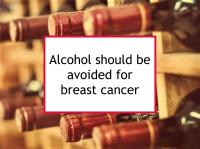Alcohol includes beverages with ethanol content such as wine, beer and ale, aperitifs, and hard liquor. Moderate to high alcohol intake has been shown to increase the risks of breast, colorectal, upper aerodigestive (mouth, esophagus, larynx, and pharynx), liver, gallbladder, pancreatic, and stomach cancers, as well as melanoma.
Breast cancer-related effects of drinking alcohol
Alcohol increases breast cancer risk
Alcohol consumption has been linked to increased risk of breast cancer and reduced survival. Even light drinking (less than one drink per day, on average) has been found to be associated with a modest increase in breast cancer risk. Alcohol intake is associated with increased breast density, a well-established breast cancer risk factor. Alcohol also has been reported to increase the risk of DCIS and LCIS, although not all studies are in agreement.
Alcohol consumption at a very young age is associated with higher likelihood of both benign breast disease and increased breast density, thereby increasing the subsequent risk of premenopausal breast cancer.
Red wine should be limited
The beneficial compounds such as resveratrol in red wine do not mitigate the harmful effects of its alcohol content for the most part. Please see our article on red wine and breast cancer for more information.
Alcohol is associated with more aggressive breast cancer
Alcohol consumption is most likely to be associated with estrogen-responsive (ER+) breast cancer, and lobular breast cancer in particular. However, generally speaking, alcohol appears to increase the aggressiveness and metastatic potential of any breast cancer that does develop. One study reported that chronic ethanol exposure altered both hormone receptor positive (ER+/PR+) and triple negative (ER-/PR-/HER2-) breast cancer cell populations by increasing the fraction of stem cell-like cells more than 20-fold. Alcohol at low concentrations has also been shown to induce proliferation, migration, and invasion in triple negative breast cancer cells. Another study found that breast cancer cells implanted in mice after being exposed to ethanol had much higher rates of growth and metastasis than those not so exposed.
Alcohol consumption has also been found to preferentially increase the risk of triple negative breast cancer in African-American women. However, one 2023 study reported that women with triple negative disease who consumed at least four drinks per week had a reduced risks of recurrence and breast cancer-specific mortality compared to those who did not drink.
Alcohol reduces the treatment effects of radiotherapy & tamoxifen
Alcohol consumption during radiotherapy has been reported to be associated with worse disease-free survival. Alcohol has also been shown to reduce the beneficial treatment effects of tamoxifen. Please see our article on tamoxifen and alcohol.
Alcohol can also increase the risk of heart damage from treatment with trastuzumab or anthracyclines such as doxorubicin.
Binge drinking carries more risk
The relationship between alcohol and breast cancer risk depends in part on a woman's individual genetic makeup. For example, fast metabolizers of alcohol (who therefore “can't hold their liquor”) have been shown to have a higher risk of breast cancer from a given level of alcohol intake than slow metabolizers.
Consuming several drinks at once is more risky than limiting consumption to one drink per session. One large 2020 study reported higher risk of breast cancer among women who drank during one to three days per week compared to those who drank the same amount over four to seven days. Occasional binge drinking increases breast cancer risk even among moderate drinkers.
Bottom line
Based on the available evidence to date, up to one glass of red wine every third day with food appears to be a safe level of consumption. Alcohol should be avoided during tamoxifen treatment.
Sources of information provided in this webpage
The information above, which is updated continually as new research becomes available, has been developed based solely on the results of academic studies. Clicking on any of the underlined terms will take you to its tag or webpage, which contain more extensive information.
Below are links to recent studies concerning this food. For a more complete list of studies, please click on alcohol.
